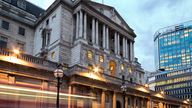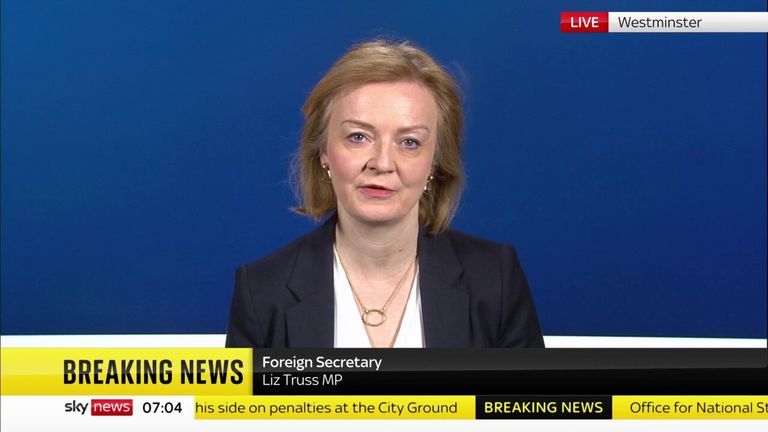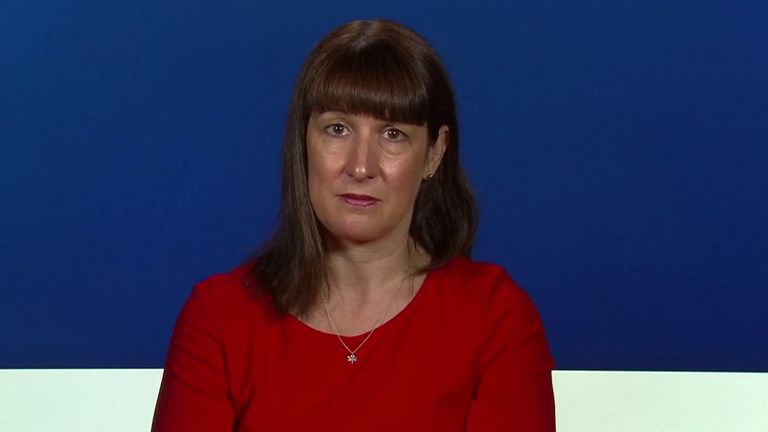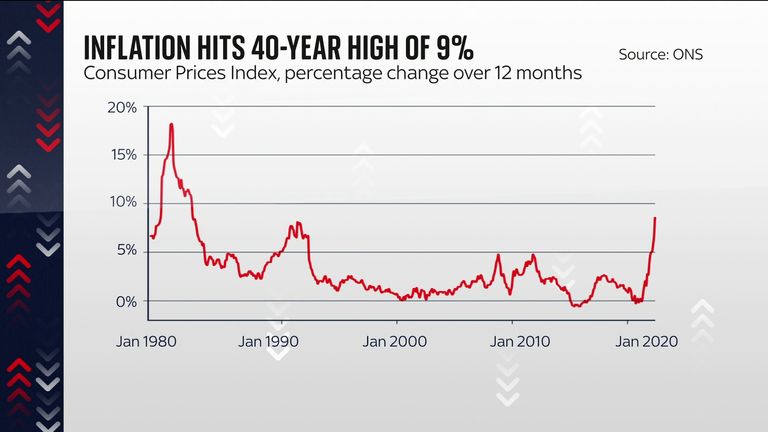Cost of living crisis: Inflation hits 40-year high of 9%
The Bank of England has warned the strain could result in a recession and surge in unemployment - intensifying pressure on the chancellor to provide further relief to consumers and businesses but he says he cannot protect people completely.
Wednesday 18 May 2022 14:16, UK
Inflation has hit its highest level in 40 years amid the deteriorating cost of living crisis.
The rate shot up to 9% last month - its highest level since comparable readings in 1982.
Cheapest and most expensive places to buy petrol revealed - cost of living latest
Data released by the Office for National Statistics (ONS) showed a broad-based hike in prices for everyday goods and services during April - with almost three-quarters of the increase accounted for by the unprecedented 54% increase in the energy price cap which kicked in at the start of the month.
The highest prices on record for both petrol and diesel were other major factors.
The main upward price shifts over the 12 months to April:
• Natural gas - 95.5%
• Electricity - 53.5%
• Motor fuels - 31.4%
• Furniture and maintenance - 10.7%
• Restaurants and hotels - 8%
• Food and non-alcoholic drinks - 6.7%
The headline consumer prices index (CPI) measure had stood at 7% in March as the immediate effects of Russia's war in Ukraine filtered through to the likes of fuel forecourts.
It was on top of existing inflation caused by the easing of COVID-19 restrictions that saw demand widely outstripping supply across the global economy.
ONS chief economist Grant Fitzner said of the latest data: "Inflation rose steeply in April, driven by the sharp climb in electricity and gas prices as the higher price cap came into effect.
"Around three-quarters of the increase in the annual rate this month came from utility bills."
He added: "Steep annual rises in the cost of metals, chemicals and crude oil also continued, along with higher prices for goods leaving factory gates. This was driven by increases for food products, transport equipment and metals, machinery and equipment."
Rising factory gate prices are a strong indicator of inflation ahead and it emerged separately on Wednesday that fuel prices had hit new records over the previous 24 hours - at 167.64p a litre for petrol and 180.88p for diesel.
The AA said it meant that the chancellor's fuel duty cut had been wiped out in 55 days.
Gas and electricity costs continue to be the main worry ahead.
UK households were spared the worst of the jump in wholesale gas costs, first seen last summer, by the price cap mechanism as it is currently adjusted only twice a year - though that is soon about to change.
The average annual cost for gas and electricity under the cap rose by £693 on 1 April to £1,971 and is currently forecast to hit almost £2,600 in total at the next adjustment, due in October.
The Bank of England released updated forecasts earlier this month that inflation will top 10% later this year - with food prices set to provide greater upwards pressure due to crucial supplies of things like wheat being held up in war-torn Ukraine.
It has warned that the strain could result in a recession and surge in unemployment.
Its rate-setting committee is now widely expected to raise Bank rate in June to 1.25%.
It would mark a fifth successive increase to tackle inflation expectations, worrying that wage rises to match the pace of price inflation will only make inflation more sticky in future.
The dire picture for the cost of living has left the chancellor under immense pressure to provide further relief to consumers and businesses.
Rishi Sunak said in response to the ONS data: "Countries around the world are dealing with rising inflation.
"Today's inflation numbers are driven by the energy price cap rise in April, which in turn is driven by higher global energy prices.
"We cannot protect people completely from these global challenges but are providing significant support where we can, and stand ready to take further action.
"We're saving the average worker £330 a year through reducing National Insurance Contributions, changing Universal Credit to save over a million families around £1,000 a year, and providing millions of families with £350 each this year to help with their energy bills."
There was a predictable backlash from business groups, opposition parties and unions which have demanded urgent action from the Treasury as the pace of inflation has accelerated.
Rain Newton-Smith, the CBI's chief economist, said: "It is critical the government explores options to help people facing real hardship now, and support cashflow for vulnerable firms."
The Resolution Foundation - a think tank that focuses on living standards - claimed that inflation for the poorest households was already topping 10% as they spend a greater share of their income on energy.
Its senior economist, Jack Leslie, said: "Inflationary pressures are likely to continue to grow through the year as the effects of higher energy prices continue to work their way through businesses and into consumers' pockets.
"Nobody knows how long these pressures will last, or how workers will respond via higher wage demands, which is why the Bank faces a tough judgement on the pace and scale of interest rate rises.
"But one thing is certain - the government must provide further targeted support for those lower income families at the sharp end of this crisis."








